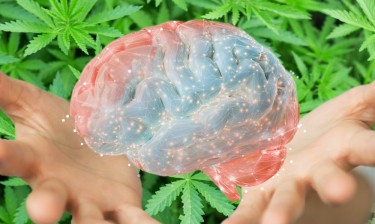
The harmful effects of cannabis use throughout adolescence, when the brain is going through a vital developmental stage, are well acknowledged. A comprehensive study on cannabis is still being conducted, though, and there are still many unanswered questions that scientists are working to fill.
A new study by Portuguese researchers that was published in the Journal Psychopharmacology aims to close some of these gaps by concentrating on the sporadic cannabis usage of adolescent subjects.
In the end, the study's conclusions confirm that, as compared to their counterparts who do not use cannabis, teenagers who use it sometimes have no appreciable changes in cognitive performance.
Investigating Gaps in a Well-Studied Area
Researchers embark on a journey to dissect prevalent barriers in cannabis research, particularly its impact on brain functions. Delving into the realms of psychology, neurocognition, and brain dynamics during adolescence, they highlight the alterations in the endocannabinoid system, emphasizing its connection with stress and anxiety regulation, which potentially heightens vulnerability to emotional and anxiety disorders among adolescents.
Acknowledging the discrepancies in existing literature, the researchers advocate for further exploration using longitudinal research methodologies.
"Many adolescents partake in sporadic cannabis use, with non-problematic usage being significantly more common than instances of Cannabis Use Disorder," the authors emphasize. "Hence, it's imperative to scrutinize the neurocognitive and psychological ramifications among adolescents escalating to heavier cannabis use and those maintaining minimal consumption."
Leveraging data from the extensive longitudinal IMAGEN study cohort, primarily characterized by infrequent to moderate cannabis usage, the study probes into whether pre-existing variations in reward-related brain activity, psychopathology, and cognitive performance predict cannabis initiation. Additionally, it examines whether cannabis usage leads to compromised levels of functioning in these domains and, if so, whether these impairments recover upon cessation of use.
Exploring the Impact of Occasional Cannabis Use on Adolescent Behavior
The study recruited participants from eight locations across England, Ireland, France, and Germany. At the baseline measurement, participants averaged 14 years of age, 19 at the first follow-up, and 22 at the second follow-up. Eligible participants reported either no or low risk of alcohol use and nicotine dependence at the baseline.
Individuals who had used any illicit substance more than twice or had a total of more than eight uses of illicit substances in their lifetime were excluded from the sample, resulting in 1,946 eligible participants.
Throughout the study, participants completed various questionnaires to assess substance use, psychopathology, and cognition. Additionally, researchers utilized the Puberty Development Scale and a scale measuring family stressors experienced by participants.
A cognitive task was administered at each time point, where participants were instructed to respond promptly to targets by pressing a button. Depending on their performance, participants could earn two, ten, or no points, with the incentive of receiving candy for every five points earned.
The research primarily focused on examining brain responses during anticipation of gains and feedback on successful and unsuccessful trials. Statistical analyses were also conducted to determine if baseline characteristics predicted later cannabis use, with logistic regression analyses comparing cannabis users at the first follow-up with non-users.
Minimal Adolescent Cannabis Use: Absence of Cognitive Decline
Examining the initial inquiry into baseline predictors of cannabis initiation at age 19, researchers found that participants with higher scores in conduct problems and lower scores in peer-related issues at age 14 were more likely to use cannabis at age 19. However, neither the anticipation of rewards nor the processing of feedback predicted cannabis use at 19 years old.
In comparing cannabis users to non-users, researchers observed that the cannabis-using cohort had higher scores at ages 14 and 19, as well as increased hyperactivity/inattention scores at age 19. Nevertheless, there were no statistically significant differences detected in cognitive function, psychopathology, or brain activity.
"We did not identify any cognitive impairment in light cannabis users, neither before nor after cannabis use onset," researchers assert. "Indeed, despite the broad association between adolescent cannabis use and neurocognitive impairment, our findings suggest that these effects are minor and may not have clinical significance."
At age 22, persistent cannabis users exhibited "significantly higher" conduct problems compared to the control group. However, due to the lack of significant disparities in cognitive function and brain activity, the hypothesis regarding recovery with abstinence was not tested, as researchers note.
The authors suggest that a larger sample size could enhance the robustness of statistical analyses and findings. They also mention that a greater representation of heavy cannabis users would improve the generalizability of results, despite the similarity in cannabis use patterns with previous studies that also found no group differences in reward-related brain activity.
Researchers emphasize that these findings may only apply to the effects experienced by low-frequency cannabis users, not heavy users or those with cannabis use disorder.
"The study design allowed for an examination of potential preexisting differences in brain activity, cognitive function, and psychological symptoms in a developmental sample of adolescents who would engage in light cannabis use in the future," the authors conclude.
"We found no evidence of preexisting individual differences in reward processing or specific cognitive domains," they continue. "However, cannabis-naïve adolescents with conduct problems and those who were more socially connected with their peers appear to be at a higher risk of engaging in persistent cannabis use in the future. Additionally, cannabis use during adolescence may lead to the development of hyperactivity and inattention symptoms."
Bottom Line
The study indicates that occasional cannabis use during adolescence may not result in notable cognitive decline. Despite potential risk factors such as conduct problems and strong social ties with peers correlating with persistent cannabis use, the research did not detect significant impairment in cognitive function. However, these findings warrant further investigation with larger sample sizes and representation of heavy cannabis users to validate the results. Understanding the impact of cannabis use on adolescent development is crucial, and while this study provides valuable insights, continued research is necessary to comprehensively assess the effects of cannabis on cognitive health during this critical stage of brain development.
CANNABIS SLOWS COGNITIVE DECLINE IN THE ELDERLY, READ ON...
CANNABIS SLOWS COGNTIVE DECLINE IN THE ELDERY SAYS NEW STUDY!






